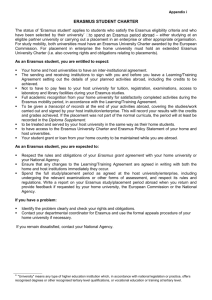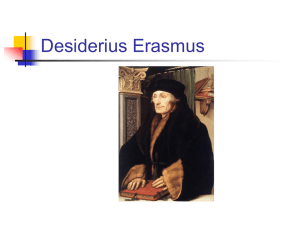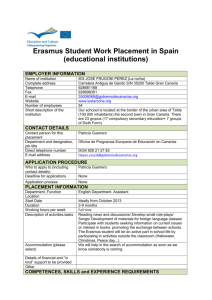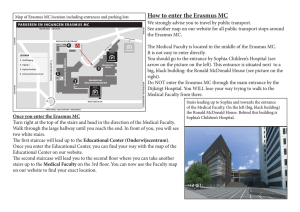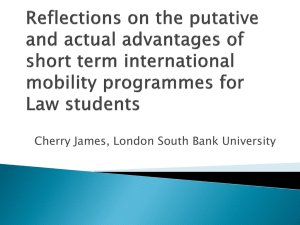Erasmus Student Charter
advertisement
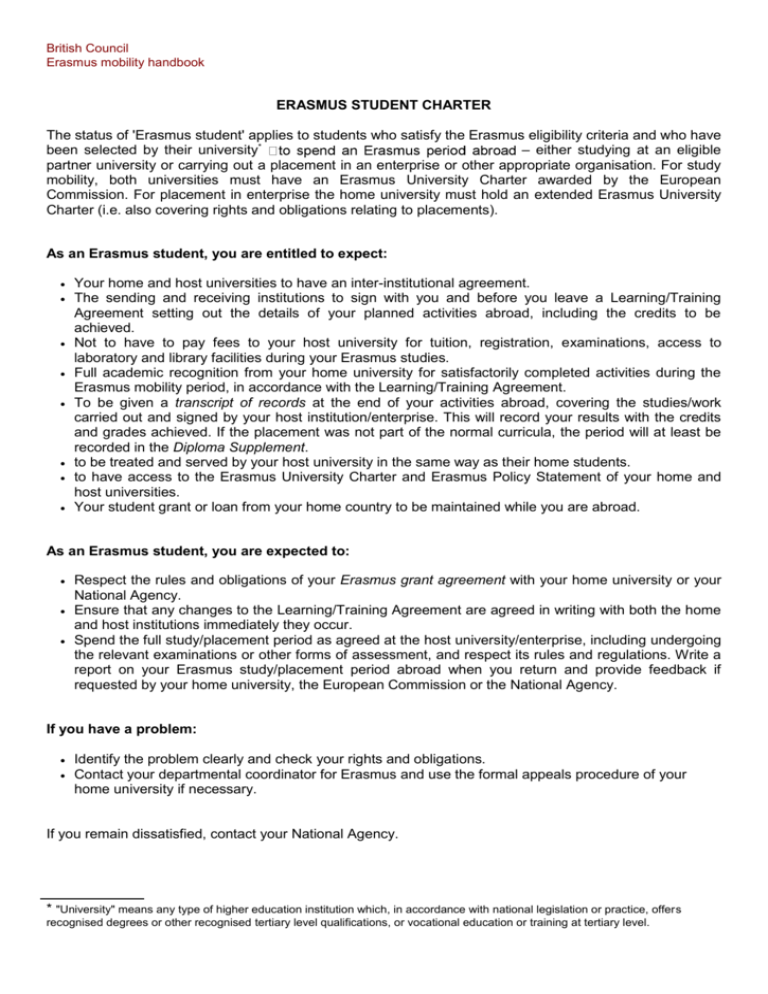
British Council Erasmus mobility handbook ERASMUS STUDENT CHARTER The status of 'Erasmus student' applies to students who satisfy the Erasmus eligibility criteria and who have been selected by their university* – either studying at an eligible partner university or carrying out a placement in an enterprise or other appropriate organisation. For study mobility, both universities must have an Erasmus University Charter awarded by the European Commission. For placement in enterprise the home university must hold an extended Erasmus University Charter (i.e. also covering rights and obligations relating to placements). As an Erasmus student, you are entitled to expect: Your home and host universities to have an inter-institutional agreement. The sending and receiving institutions to sign with you and before you leave a Learning/Training Agreement setting out the details of your planned activities abroad, including the credits to be achieved. Not to have to pay fees to your host university for tuition, registration, examinations, access to laboratory and library facilities during your Erasmus studies. Full academic recognition from your home university for satisfactorily completed activities during the Erasmus mobility period, in accordance with the Learning/Training Agreement. To be given a transcript of records at the end of your activities abroad, covering the studies/work carried out and signed by your host institution/enterprise. This will record your results with the credits and grades achieved. If the placement was not part of the normal curricula, the period will at least be recorded in the Diploma Supplement. to be treated and served by your host university in the same way as their home students. to have access to the Erasmus University Charter and Erasmus Policy Statement of your home and host universities. Your student grant or loan from your home country to be maintained while you are abroad. As an Erasmus student, you are expected to: Respect the rules and obligations of your Erasmus grant agreement with your home university or your National Agency. Ensure that any changes to the Learning/Training Agreement are agreed in writing with both the home and host institutions immediately they occur. Spend the full study/placement period as agreed at the host university/enterprise, including undergoing the relevant examinations or other forms of assessment, and respect its rules and regulations. Write a report on your Erasmus study/placement period abroad when you return and provide feedback if requested by your home university, the European Commission or the National Agency. If you have a problem: Identify the problem clearly and check your rights and obligations. Contact your departmental coordinator for Erasmus and use the formal appeals procedure of your home university if necessary. If you remain dissatisfied, contact your National Agency. * "University" means any type of higher education institution which, in accordance with national legislation or practice, offers recognised degrees or other recognised tertiary level qualifications, or vocational education or training at tertiary level. British Council Erasmus mobility handbook Appendix ii GENERAL CONDITIONS Article 1: Liability Each party of this agreement shall exonerate the other from any civil liability for damages suffered by him or his staff as a result of performance of this agreement, provided such damages are not the result of serious and deliberate misconduct on the part of the other party or his staff. The UK National Agency, the European Commission or their staff shall not be held liable in the event of a claim under the agreement relating to any damage caused during the execution of the placement. Consequently, the UK National Agency or the European Commission shall not entertain any request for indemnity of reimbursement accompanying such claim. Article 2: Termination of the Contract In the event of failure by the beneficiary to perform any of the obligations arising from the agreement, and regardless of the consequences provided for under the applicable law, the institution is legally entitled to terminate or cancel the agreement without any further legal formality where no action is taken by the beneficiary within one month of receiving notification by registered letter. If the beneficiary terminates the agreement before its agreementual end or if he/she fails to follow the agreement in accordance with the rules, he/she will have to refund the amount of the grant already paid. In case of termination by the beneficiary due to "force majeure", i.e. an unforeseeable exceptional situation or event beyond the beneficiary's control and not attributable to error or negligence on his/her part, the beneficiary will be entitled to receive the amount of the grant corresponding to the actual time of the placement. Any remaining funds will have to be refunded. Article 3: Data Protection All personal data contained in the agreement shall be processed in accordance with Regulation (EC) No 45/2001 of the European Parliament on the protection of individuals with regard to the processing of personal data by the Community institutions and bodies and on the free movement of such data. Such data shall be processed solely in connection with the implementation and follow-up of the agreement by the sending institution, the National Agency and the European Commission, without prejudice to the possibility of passing the data to the bodies responsible for inspection and audit in accordance with Community legislation (Court of Auditors or European Antifraud Office (OLAF)). The beneficiary may, on written request, gain access to his/her personal data and correct any information that is inaccurate or incomplete. He/she should address any questions regarding the processing of his/her personal data to the sending institution and/or the National Agency. The participant may lodge a complaint against the processing of his/her personal data with the Information Commissioner's Office with regard to the use of these data by the sending institution, the National Agency, or to the European Data Protection Supervisor with regard to the use of the data by the European Commission. Article 4: Checks and Audits The parties of the agreement undertake to provide any detailed information requested by the European Commission, the UK National Agency or by any other outside body authorised by the European Commission or the UK National Agency to check that the Placement and the provisions of the agreement are being properly implemented.
